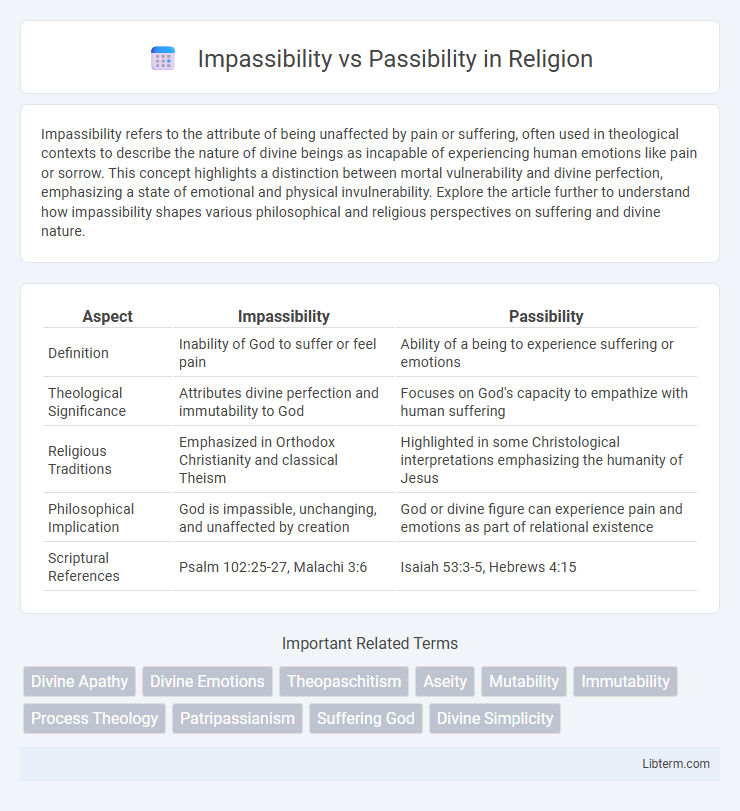Impassibility refers to the attribute of being unaffected by pain or suffering, often used in theological contexts to describe the nature of divine beings as incapable of experiencing human emotions like pain or sorrow. This concept highlights a distinction between mortal vulnerability and divine perfection, emphasizing a state of emotional and physical invulnerability. Explore the article further to understand how impassibility shapes various philosophical and religious perspectives on suffering and divine nature.
Table of Comparison
| Aspect | Impassibility | Passibility |
|---|---|---|
| Definition | Inability of God to suffer or feel pain | Ability of a being to experience suffering or emotions |
| Theological Significance | Attributes divine perfection and immutability to God | Focuses on God's capacity to empathize with human suffering |
| Religious Traditions | Emphasized in Orthodox Christianity and classical Theism | Highlighted in some Christological interpretations emphasizing the humanity of Jesus |
| Philosophical Implication | God is impassible, unchanging, and unaffected by creation | God or divine figure can experience pain and emotions as part of relational existence |
| Scriptural References | Psalm 102:25-27, Malachi 3:6 | Isaiah 53:3-5, Hebrews 4:15 |
Understanding Divine Impassibility
Divine impassibility refers to the theological doctrine that God does not experience pain or suffering, maintaining perfect immutability and sovereignty. This concept contrasts with passibility, which implies the capability to feel emotions or be affected by external forces. Understanding divine impassibility highlights God's transcendence and unchanging nature, ensuring His eternal perfection and freedom from emotional fluctuations or vulnerabilities.
Defining Divine Passibility
Divine passibility refers to the attribute of God being capable of experiencing suffering, emotion, or change, contrasting with divine impassibility, which asserts God's complete freedom from such experiences. The debate centers on whether God's nature allows Him to be affected by external forces or if He remains immutable and unaffected by creation's fluctuations. Understanding divine passibility involves examining scriptural depictions of God's responsiveness and relational suffering to reconcile divine omnipotence with empathetic presence.
Historical Development of the Debate
The historical development of the impassibility versus passibility debate centers on theological interpretations of God's nature, particularly within Christian doctrine. Early Church Fathers like Augustine emphasized divine impassibility, asserting that God is incapable of suffering or emotional change, aligning with divine immutability. Contrastingly, later theologians such as Thomas Aquinas nuanced this stance by recognizing God's impassibility while allowing for a communicable suffering experienced in the person of Christ, reflecting a theological evolution influenced by Christological considerations and scriptural exegesis.
Key Differences Between Impassibility and Passibility
Impassibility refers to the theological concept that God is incapable of experiencing pain or suffering, emphasizing divine immutability and transcendence. Passibility, in contrast, acknowledges that God can experience emotions, suffer, or be affected by creation, highlighting divine empathy and relationality. The key differences lie in the implications for God's nature, where impassibility suggests emotional detachment, while passibility supports the idea of God's participation in human experiences.
Scriptural Foundations for Each View
The doctrine of impassibility asserts that God does not experience pain or suffering, supported by biblical passages such as Malachi 3:6, where God declares "I am the Lord, I do not change," emphasizing divine immutability. Passibility, contrastingly, highlights Scripture like Isaiah 53:3-5 and Hebrews 4:15, where God's Son suffers and empathizes with human weakness, underscoring the incarnation and redemptive suffering. Both views derive from different biblical texts that shape distinct theological understandings of God's nature in relation to human experience.
Philosophical Implications of Divine Emotion
Impassibility and passibility debate the nature of divine emotion, where impassibility asserts God's incapacity to experience pain or suffering, reflecting divine immutability and perfection. Philosophical implications of impassibility emphasize God's transcendence and impersonal nature, excluding emotional changes that imply vulnerability. Conversely, passibility supports a God who can experience emotions, fostering relational closeness and responsiveness, which affects theological understandings of divine empathy and human suffering.
Theological Arguments for Impassibility
Theological arguments for divine impassibility emphasize God's unchanging nature, asserting that God does not experience suffering or emotional changes, which preserves divine perfection and immutability. Classical theologians such as Thomas Aquinas argue that passion entails passivity, contradicting God's self-sufficiency and aseity. Scriptural interpretations supporting impassibility highlight God's transcendence above human vulnerabilities, ensuring divine sovereignty and eternal constancy.
Theological Arguments for Passibility
Theological arguments for passibility emphasize God's capacity to experience emotions, suffer, and respond to creation, highlighting a relational and dynamic deity. Passibility supports scriptural depictions of God expressing grief, anger, and compassion, which align with the incarnation and atonement narratives in Christian theology. Advocates argue that a passible God is more accessible and empathetic, fostering a meaningful interaction between the divine and humanity.
Pastoral and Practical Considerations
Impassibility, the theological doctrine that God is incapable of suffering or emotional change, influences pastoral care by providing believers with assurance of God's unwavering stability and eternal sovereignty in times of trial. Passibility, in contrast, emphasizes God's empathetic participation in human suffering through Christ's incarnation, fostering a pastoral approach centered on divine compassion and relatable presence amid hardship. Practical considerations for ministry involve balancing these views to offer comfort through God's immutable nature while validating the believer's experience of divine empathy and support in suffering.
Contemporary Perspectives and Future Directions
Contemporary perspectives on impassibility and passibility explore the theological debate concerning God's capacity to experience suffering or emotion, with recent scholarship increasingly emphasizing relational and dynamic models of divinity that challenge classical impassibility. Emerging approaches in process theology and open theism underscore God's responsiveness and emotional engagement with creation, suggesting a passible understanding that aligns with human experiences of empathy and vulnerability. Future directions aim to integrate scientific insights on consciousness and emotion with theological frameworks, fostering a more nuanced discourse that bridges traditional metaphysics and contemporary existential concerns.
Impassibility Infographic

 libterm.com
libterm.com